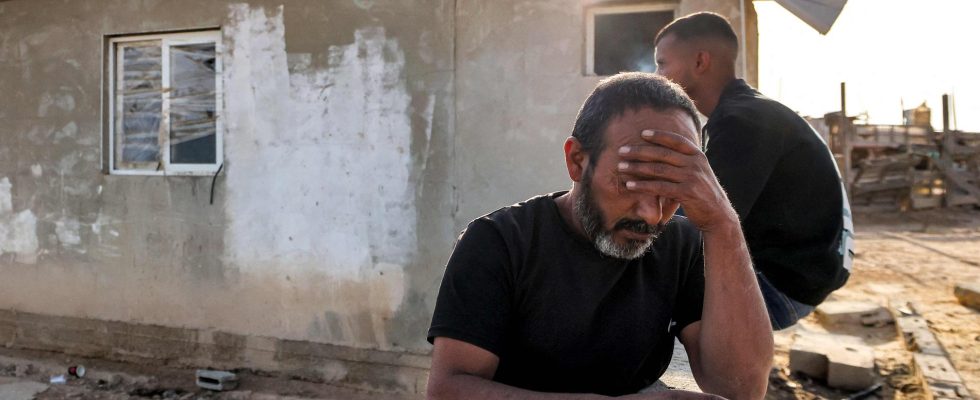Tina Magnergård Bjers/TT
unsaveSave
expand-left
full screen Factory worker Mohamed al-Hasoni, photographed outside the house in the Negev desert where his seven-year-old daughter Amina was hit by shrapnel during the weekend’s Iranian attack on Israel. al-Hasoni says the daughter, who is now receiving intensive care, is cheerful and loves to draw. Photo: Ahmad Gharabli/AFP/TT
The explosions above the Negev desert in Israel were intense and air defense sirens sounded.
But the al-Hasoni Bedouin family had nowhere to take shelter when shrapnel started falling from the sky. Now their seven-year-old daughter is fighting for her life.
Amina al-Hasoni is the only one seriously injured in this weekend’s Iranian airstrikes against Israel. Her parents and 13 siblings now take turns guarding the intensive care unit of the hospital in Beersheba.
– We had nowhere to take shelter, states her father, factory worker Mohamed al-Hasoni, for the AFP news agency.
No warnings
Darkness had settled over the desert village of al-Fura when Iran’s large-scale airstrikes, in retaliation for an earlier attack on Iran’s consulate in Damascus, were manifested in the sky on Sunday night. The Israeli air defenses have been praised for the precision with which the Iranian robots and drones were shot down. But dotted drones result in wreckage and shrapnel, something most Israelis can take cover from.
However, the country’s approximately 300,000 Bedouins do not have the same access to warning systems and shelters. The Bedouin, many of whom are descended from Arab shepherds who lived in the Negev long before Israel was founded in 1948, have long considered themselves exempt. A large percentage live in villages that are not recognized by the authorities, places that lack water, sewage and electricity.
The al-Hasoni family belongs to that group. Their simple house has no electricity and is threatened with demolition. After all, when the explosions intensified last Sunday night, they decided to leave the home on the hill. Amina al-Hasoni’s uncle, Ismail, tells The New York Times that he was nearby when he heard his sister scream.
Growing anger
The maternal uncle rushed there and found the sister with a bleeding seven-year-old in her arms. The girl had been slower than the others to get out of bed. On her way from her butterfly-adorned pink bedroom, she was hit in the head by a piece of metal from a robot that penetrated the ceiling.
– I think it hit her when she was running, says Ismail, who does not give a surname.
He rushed with the girl in his arms until he found a car that could take her to hospital. On his return he saw the large pool of blood on the tiled floor of the house. Later it was announced that police had found over 150 pieces of shrapnel and wreckage in the area.
Among Bedouins in general and the al-Hasoni family in particular, anger is now growing over the fate of the seven-year-old. Outside the hospital where she is being treated, an upset Jabbar Agu Caf, chairman of the regional Bedouin council, watches.
– We demand our rights. Our villages must be protected, he told AFP.
– It is always Bedouins who become victims, regardless of whether the shelling comes from the east or the west.
